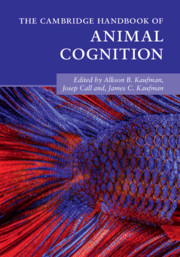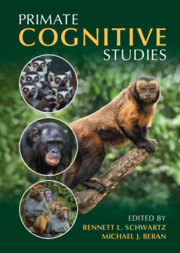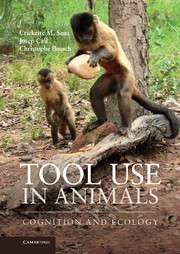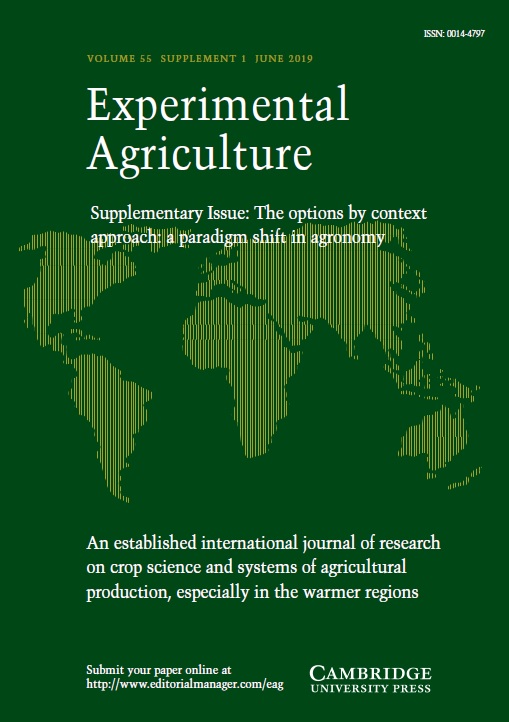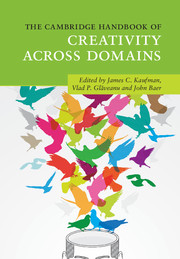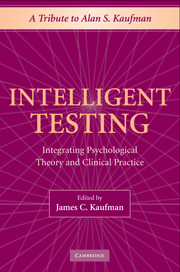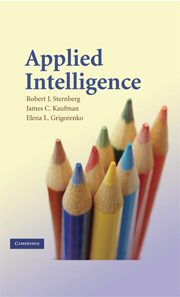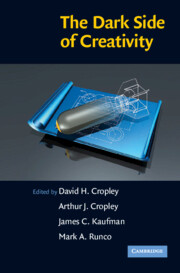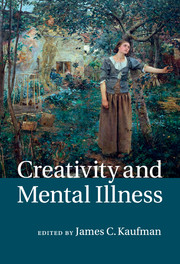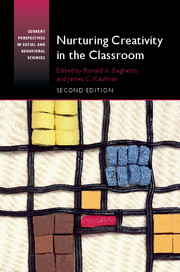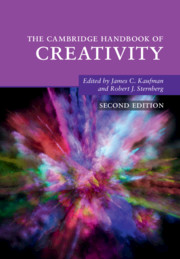The Cambridge Handbook of Animal Cognition
Part of Cambridge Handbooks in Psychology
- Editors:
- Allison B. Kaufman, University of Connecticut
- Josep Call, University of St Andrews, Scotland
- James C. Kaufman, University of Connecticut
- Date Published: July 2021
- availability: In stock
- format: Paperback
- isbn: 9781108445481
Paperback
Other available formats:
Hardback, eBook
Looking for an inspection copy?
This title is not currently available on inspection
-
This handbook lays out the science behind how animals think, remember, create, calculate, and remember. It provides concise overviews on major areas of study such as animal communication and language, memory and recall, social cognition, social learning and teaching, numerical and quantitative abilities, as well as innovation and problem solving. The chapters also explore more nuanced topics in greater detail, showing how the research was conducted and how it can be used for further study. The authors range from academics working in renowned university departments to those from research institutions and practitioners in zoos. The volume encompasses a wide variety of species, ensuring the breadth of the field is explored.
Read more- Provides overviews of animal communication and language, memory, social cognition, social learning and teaching, quantitative abilities, innovation, and problem solving
- Contains a roster of international experts from renowned university departments, research institutions, and zoos
- Includes a wide variety of species as examples from ants to fish to elephants.
Awards
- Winner, 2022 Choice Outstanding Academic Titles
Reviews & endorsements
'The creative research and wealth of information presented in this handbook exceed all expectations. We are at the cusp of an entirely new field of evolutionary cognition. Experts in their field offer commentary on all of the hot topics, from altruism to planning, citing a wide range of species.' Frans de Waal, Charles Howard Candler Professor of Primate Behavior and Director of the Living Links Center, Emory University, USA, and author of Are We Smart Enough to Know How Smart Animals Are?
See more reviews'This is a well-written, state-of-the-art overview of all the important issues in the field of comparative cognition. It is a great primer for those who want to learn more and an invaluable addition for scholars in the field who want the latest overview.' Laurie Santos, Professor of Psychology, Yale University, USA
'This handbook offers the expected comprehensive survey of animal cognition, with authoritative overviews of six major topics, but each of them is also followed by various, often surprising case studies. This refreshing combination of compelling reviews and novel directions reflects the excitement of this emerging field and should inspire experts and novices alike.' Judith Burkart, Professor of Anthropology, University of Zürich, Switzerland
'Filled with the latest findings from the researchers who made the discoveries, surprising animal brilliance is revealed. Anyone who loves animals will delight in the chance to look through the window this book provides into the minds of other beings. Be prepared to have your ideas of human exceptionalism challenged.' Brian Hare, Professor of Evolutionary Anthropology, Duke University, USA
'What goes on in the minds of other animals? How do they solve problems, remember, and communicate? This compilation brings together leading ethologists and comparative psychologists presenting introductions to the study of animal cognitive capacities and its many captivating research questions.' Thomas Suddendorf, Professor of Psychology, University of Queensland, Australia, and author of The Gap: The Science of What Separates Us from Other Animals
'Given the exciting but exponentially-expanding reach of animal cognition research, this handbook is a godsend to novices and experts alike. It offers fresh perspectives written by well-chosen authors, from household names to rising stars. The volume features introductions to six major aspects of cognition each followed by focused articles.' Andrew Whiten, Wardlaw Professor of Evolutionary and Developmental Psychology, University of St Andrews, UK
'The volume stands out for several reasons. It features broad introductions and specific in-depth case studies, it covers a wide range of taxa and various contributors have an ecological-evolutionary background. This powerful combination makes this Handbook appealing to all students of animal cognition.' Redouan Bshary, Professor of Eco Ethology, University of Neuchâtel, Switzerland
'This handbook is an excellent reference source of information on various kinds of cognitive phenomena in a wide range of animals, ranging from ants to elephants. I cannot imagine any behavioral and cognitive scientist who would not profit from delving into this very fine book. I highly recommend it.' Ludwig Huber, Head of Comparative Cognition, Messerli Research Institute
'This is a delightful and comprehensive collection of chapters exploring the animal mind. It provides both breadth and depth, balancing thoughtful topical overviews along with deep dives into specific research areas. This impressive handbook is a must-have for anyone interested in animal minds.' Evan MacLean, Director of the Arizona Canine Cognition Center and Assistant Professor of Anthropology and Veterinary Medicine, University of Arizona, USA
'In these thorough, detailed essays, animal cognition comes of age, transcending its ethological roots. There are strong reviews of social cognition, learning, and innovation and insightful explorations of representation, episodic memory, reciprocity, and self-recognition. The taxonomic diversity is remarkable. Any behavioral scientist will find much here that is novel and stimulating.' Alan Bond, Emeritus Professor of Biological Sciences, University of Nebraska, USA
'Highly recommended.' J. A. Mather, Choice Magazine
Customer reviews
Not yet reviewed
Be the first to review
Review was not posted due to profanity
×Product details
- Date Published: July 2021
- format: Paperback
- isbn: 9781108445481
- length: 828 pages
- dimensions: 242 x 171 x 43 mm
- weight: 1.41kg
- availability: In stock
Table of Contents
Section I. Communication and Language:
1.1 Communication and Language Overview Federico Rossano and Stephan Kaufhold
1.2 Communication in Ant Societies Baptiste Piqueret and Patrizia d'Ettorre
1.3 Symbolic Communication in the Grey Parrot Irene M. Pepperberg
1.4 Communication in Dogs and Wolves Katalin Oláh, József Topál and Anna Gergely
Section II. Memory and Recall:
2.6 Memory and Recall Overview Gema Martin-Ordas
2.7 A Fish Memory Tale: Memory and Recall in Fish and Sharks Catarina Vila Pouca, Louise Tosetto and Culum Brown
2.8 Memory in Humming Birds Maria Cristina Tello-Ramos and David J Pritchard
2.9 Event Memory in Rats Jonathon D. Crystal
2.10 Primate Recall Memory Molly Flessert and Michael J. Beran
Section III. Social Cognition:
3.11 Social Cognition Overview Juan C. Gomez
3.12 Proximate and Ultimate Mechanisms of Cooperation in Fishes Joachim G. Frommen and Stefan Fischer
3.13 Evolutionary and Neural Bases of the Sense of Animacy Elena Lorenzi and Giorgio Vallortigara
3.14 Raven Social Cognition and Behaviour Thomas Bugnyar
3.15 Reciprocity in Norway Rats (Rattus Norvegicus) Manon K. Schweinfurth
3.16 Exploring the Social Minds of Elephants Elizabeth A. Krisch and Joshua M. Plotnik
3.17 Dolphin Social Cognition Adam A. Pack
3.18 Mirror Self-Recognition: Five Decades of Primate Research James R. Anderson and David L. Butler
Section IV. Social Learning and Teaching:
4.19 Social Learning and Teaching Overview Rachel L. Kendal
4.20 Tandem-Running Recruitment by Temnothorax Ants as a Model System for Social Learning Takao Sasaki and Stephen C. Pratt
4.21 Fish Social Networks Matthew J. Hasenjager and William Hoppitt
4.22 Social Learning in Birds Victoria E. Lee, Alison L. Greggor and Alex Thornton
4.23 Social Learning in Chimpanzees Rachel Nelson, Erin Connelly and Lydia M. Hopper
Section V. Numerical and Quantative Abilities:
5.24 Numerical and Quantitative Abilities Overview Sarah T. Boysen
5.25 Numerical Competence in Fish Christian Agrillo and Maria Elena Miletto Petrazzini
5.26 Spatial-Numerical Association in Non-Human Animals Rosa Rugani and Orsola Rosa-Salva
5.27 Perceptual Categorization in Pigeons Olga F. Lazareva
Section VI. Innovation and Problem Solving:
6.28 Innovation and Problem-Solving Overview Daniel Sol
6.29 General Intelligence (g) in Mice Charles Locurto
6.30 Bowerbird Innovation and Problem-Solving Jason Keagy
6.31 Parrot Innovation Theresa Rössler, Berenika Mioduszewska and Alice M.I. Auersperg
6.32 Innovation in Marine Mammals Allison B. Kaufman
6.33 Innovation in Capuchin Monkeys Eduardo B. Ottoni
6.34 Innovation and Problem Solving in Orangutans Anne E. Russon
6.35 Do Apes and Monkeys Know What They [Don't] Know? The Question of Metacognition in Primates Heidi L. Marsh
6.36 Decision-Making in Animals: Rational Choices and Adaptive Strategies Francesca De Petrillo and Alexandra G. Rosati.
Sorry, this resource is locked
Please register or sign in to request access. If you are having problems accessing these resources please email [email protected]
Register Sign in» Proceed
You are now leaving the Cambridge University Press website. Your eBook purchase and download will be completed by our partner www.ebooks.com. Please see the permission section of the www.ebooks.com catalogue page for details of the print & copy limits on our eBooks.
Continue ×Are you sure you want to delete your account?
This cannot be undone.
Thank you for your feedback which will help us improve our service.
If you requested a response, we will make sure to get back to you shortly.
×
